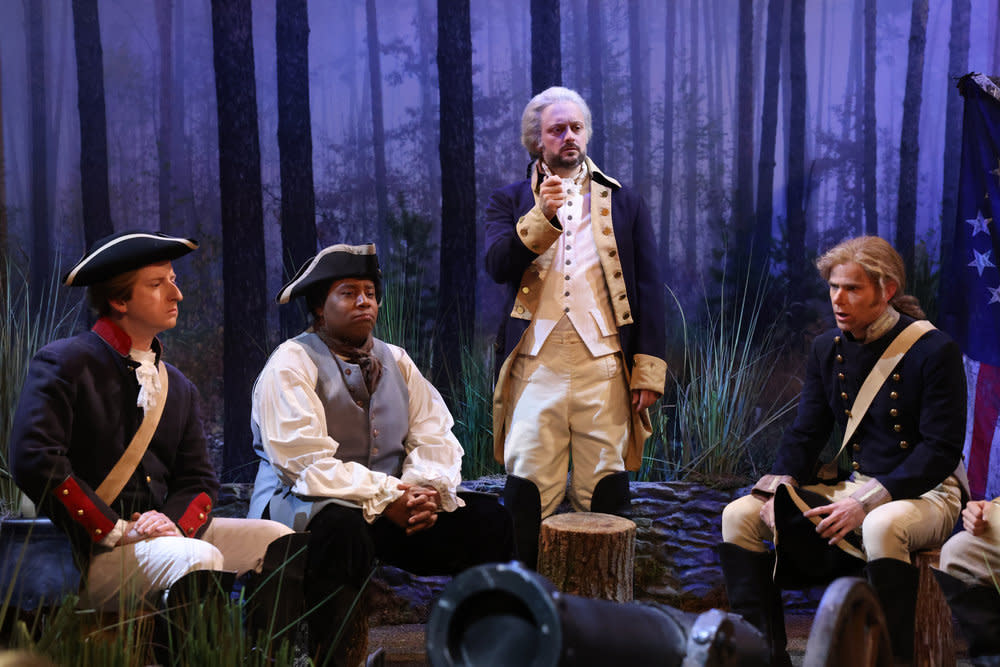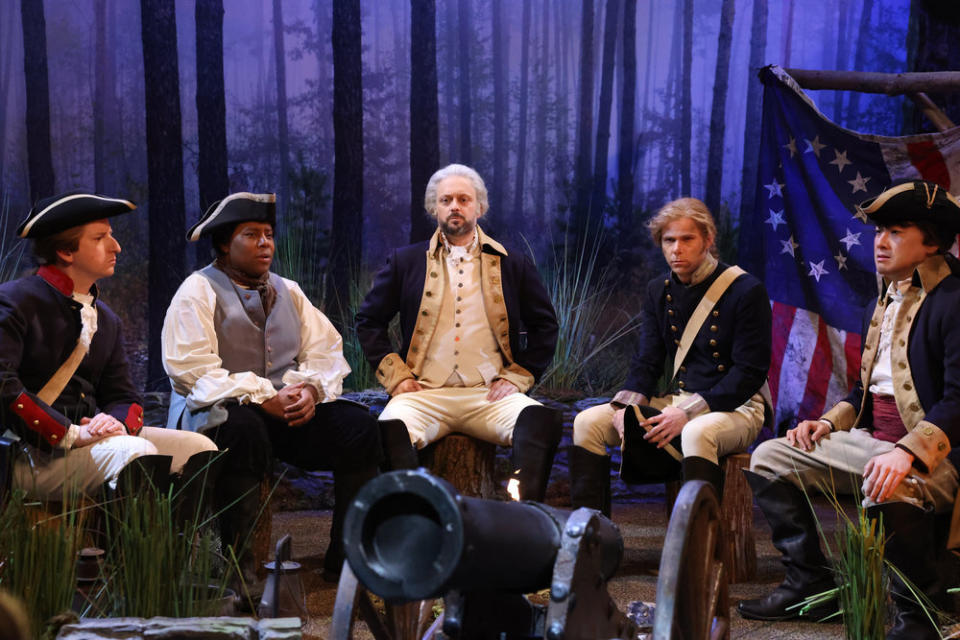An Oral History of ‘Washington’s Dream,’ the Best ‘SNL’ Sketch in Years

Nate Bargatze was an unconventional choice to host the Halloween 2023 episode of “Saturday Night Live.” But hey, the actors were still on strike, the talented comic’s standup career is taking off, and somebody had to don the George Washington wig.
The result was “Washington’s Dream,” written by SNL co-head writer Streeter Seidell and Mikey Day with an assist from Auguste White, and starring Bargatze as Washington and Day, James Austin Johnson, Bowen Yang, and Kenan Thompson as his dejected Revolutionary War soldiers. Thompson had an especially good reason to be pessimistic about America’s future.
More from IndieWire
'Daisy Jones and the Six' Creates a '70s Band - and Recreates the '70s
'Welcome to Wrexham' Asks Complicated Question of What It Means to Be a Fan
The setting: an American army camp. The year: 1777. Bargatze-as-Washington reminds his tired troops what they’re fighting for: the right to determine their new country’s own “system of weights and measures” — one that’s independent from the British Monarchy with the added benefit of being far more random and confusing. The 4-minute, 40-second live sketch was one of the best on “SNL” in years — and we do not say that lightly. At this writing, “Washington’s Dream” had 4 million YouTube views over its 12 days of availability. It deserves even more.
It also deserves a backstory. This oral history has been edited and condensed for clarity.
STREETER SEIDELL, “SNL” HEAD WRITER: I wrote a draft of it last season. I forget who we originally wrote it for, but it was very much a dramatic actor who would play more of a serious Washington. You can see that version of it, but in hindsight Nate was the perfect person to do it because it had this charm that I don’t know that it would have with a real powerful George Washington. An Academy Award-winning actor might have taken it too seriously.
MIKEY DAY, “SNL” PERFORMER AND WRITER: You wouldn’t necessarily think of Nate as, “Oh, he’d make a great George Washington.” But when we played it out, it was like, “Wow, he’s a great George Washington!”
SEIDELL: So it was just kind of sitting half-finished on my computer. I always liked it. It just felt like such a weird, wild swing, you know? It’s not topical, it’s clearly not historically accurate. But for some reason, when Nate came, we talked and we were like, “Let’s finish that off, throw it in, and see what happens.”
DAY: I do know there were a couple of different settings for it. Like, is it Washington in the Oval Office? Or, I don’t know if the Oval Office was around back then.
SEIDELL: The original draft was Washington’s inauguration at Federal Hall in New York. I had been watching the HBO series “John Adams” and there’s a scene at Washington’s inauguration where no one could hear him because he’s speaking softly during his speech — there’s hundreds of thousands of people lining Wall Street trying to hear him. And Mikey and I were joking about that, so that was the original setting. Valley Forge just felt like it had a little more weight to it — the stakes are higher.
DAY: And now it’s about what they’re fighting for.
SEIDELL: Right, as opposed to now that I’m president, here’s what we’re gonna do.
DAY: This was a big victory for Streeter because he LOVES history. Oftentimes we’ll be in our office and he’ll just make these deep-cut historical observations like, “Do you think a sketch would work about a weird land purchase in 1798 where half the continental U.S. was under the ownership of this random trading company?” It had a Christmas Day vibe for Streeter.
SEIDELL: I was emboldened because I had a sketch the week before that I wrote with Marcello Hernández about conquistadors coming back to Spain with their glorious bounty of turkeys and llamas — and the Spanish nobles being underwhelmed. I had written that one the previous season as well — it was for Ana de Armas. It didn’t work well. But it worked with Bad Bunny, and I thought, “Maybe I could get away with another history one!”
DAY: If Nate comes back to host again, there’s a lot more stuff about America and the differences and our weird policies and systems to talk about.
SEIDELL: People have been complaining about America’s weird system of weights and measurements and doing jokes about it forever. It’s not like it hasn’t been remarked upon by every single European you’ve ever met — and every scientist. Writing it was very easy; we almost had too many avenues to go down. There were originally jokes about millimeters and how we’ll use them just for guns, but we’re also going to use one called “caliber” and no one knows the difference.
Another joke that I kept trying to work in was how there’s a different kind of mile for when you’re sailing on the sea — a nautical mile. I just couldn’t do it because I don’t think it’s well-known enough.
DAY: We were going to talk about fathoms and leagues at one point.
Soldier: “What about depth?”
Washington: “No, that’s a whole different thing.”
SEIDELL: The football joke came in later after we scrapped the millimeters/caliber thing, which just didn’t feel strong enough. This kind of sketch is one where you’re walking such a fine line in being specific— but not so specific that you start alienating people.
DAY: The temperature beat did, for a minute, have the Kelvin scale too.
SEIDELL: The joke was: “Our scientists will use a third one that no one actually knows what it is, other than them.”
To be fair to our country, all of that is England’s fault. They came up with all this stuff.
DAY: And saddled us with it.
SEIDELL: We’re provincial; we’re not sophisticated. I think you can do this sketch for literally any country, or society, or culture.

SEIDELL: The stuff with Kenan was probably the only historically accurate thing in the sketch. The founding fathers just kind of punted on slavery. In an effort to unite the colonies they went, “Let’s just not go into that. We’ll do a Civil War about it 100 years from now and they can handle that.”
Kenan was great, and James and Bowen are such trusted performers. You need that for a service sketch.
DAY: Yeah, you’re setting up Washington.
SEIDELL: Casting the supporting roles comes down to: “Who can still be entertaining with lines that are all questions — and play the reaction at the right level?” Not to say no one else here can do it. Plus, Bowen looked incredible in that outfit. I was like, “I don’t know what’s going on, but this tricorner hat and tied-back ponytail is working.” And James kind of looks like he’s of that era.
DAY: At dress, they put dirt makeup on me because we had just been in a battle. And I was like, “Yo, the other soldiers aren’t dirty.” And I’m just covered in dirt. I guess I was the trench guy?
SEIDELL: The sketch played well at the table read, strong enough to get into dress rehearsal. I don’t want to speak for Nate, but I think he felt like, “This is kind of my humor. This is in my lane.” You could see “weights and measures” being a standup bit of his. So he really wanted to do it. But as we camera-blocked it and rehearsed it through the week, it wasn’t quite hitting.
DAY: It felt a little off.
SEIDELL: It wasn’t quite coming together the way that anyone wanted it to — it felt stilted. I think what it was, was the lack of an audience. Nate’s a standup, he knows how to react to an audience. He knows when to pause for laughter. When we were rehearsing, he wasn’t taking those pauses, because it’s weird to take a pregnant pause and stare off and then deliver a line to no audience. His punchlines were coming right on the end of everyone’s setup lines. But once the dress crowd got in there and he heard the laughs, he played it perfectly.
DAY: Especially his staring straight off. He just looked right at the cue cards, but it came across like he’s looking off into the distance with hope for a new nation.
SEIDELL: When we re-blocked it with producer Steve Higgins, we decided to put the cue cards up high. That created the effect of Washington gazing off into the future with a lost-in-thought look. When Nate sits down later in the sketch, we put the cue cards down low.
SEIDELL: The music in “Washington’s Dream” was great, too. Originally, the music was the end-credits song from “Glory.” Obviously, we can’t use that. But I thought they replaced it well; the music builds as Washington says increasingly stupid stuff. Watching it on the floor, I was like, “OK, this came together at the right time.” I think the best the sketch was, was on air.
I think Mikey and I were as surprised as anyone that it went over so well. It played great. It played great at dress, too. But as a writer you watch dress under the bleachers with Lorne, and the laughs aren’t— you don’t hear them as well. And you’re also talking to Lorne and receiving notes.
DAY: It was a fun one to be out there for because it was on home base, which is always fun because you’re right there in the front. So you didn’t have to worry too much about your mark and the camera shot. It was almost like a play in terms of the performance aspect of it.
SEIDELL: Comedy is so subjective, so what someone says is the funniest thing, you might think is not. I think Mikey and I were just really proud of that one and the way it all came together. But we try to do that with whatever we write — it doesn’t always work. So when one does work as well this one did, it’s kind of like a rare treat.
DAY: It’s really fun when that happens with a live sketch, too. A lot of the pre-tapes are what go viral.
SEIDELL: I think we had a similar thing with (2016’s) David S. Pumpkins. It came together perfectly at the time that it mattered. And then in seven years, we’re gonna do it again.
Best of IndieWire
Where to Watch This Week's New Movies, from 'The Marvels' and 'Dream Scenario' to 'The Killer'
The Best Thrillers Streaming on Netflix in November, from 'Fair Play' to 'Emily the Criminal'
Sofia Coppola Movies, Ranked: 'Priscilla,' 'The Virgin Suicides,' 'Marie Antoinette,' and More
Sign up for Indiewire's Newsletter. For the latest news, follow us on Facebook, Twitter, and Instagram.
